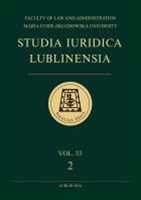Narażenie człowieka na bezpośrednie niebezpieczeństwo utraty życia albo ciężkiego uszczerbku na zdrowiu jako skutek zaniechania gwaranta. Glosa do wyroku Sądu Najwyższego z dnia 4 stycznia 2022 r. (III KK 411/21, LEX nr 3287205)
Exposing a Person to a Direct Risk of Loss of Life or Serious Damage to Health as a Result of Failure to Act by the Guarantor: Commentary on the Judgment of the Supreme Court of 4 January 2020 (III KK 411/21, LEX no. 3287205)
Author(s): Agnieszka LiszewskaSubject(s): Civil Law, Health and medicine and law, Sociology of Law, Court case
Published by: Wydawnictwo Naukowe Uniwersytetu Marii Curie-Sklodowskiej
Keywords: failure to act; effect; imminent threat; guarantor; criminal law;
Summary/Abstract: In the commented judgment, the Polish Supreme Court assumed that the result of the offense under Article 160 of the Penal Code may also be the maintenance of a state of imminent threat of death or serious damage to health in a situation where the perpetrator is the guarantor and his act consists in the failure to act required in the given circumstances. It is difficult to agree with this view, given the meaning of the concept of effect in criminal law, according to which it is a state separate from the perpetrator’s behavior, constituting a specific and objectively noticeable change in the surrounding reality. Therefore, the assessment of the occurrence of the effect should be separated from the assessment of the act itself as threatening human life or health. If the immediate threat to human life or health persists due to the failure to act by the guarantor, the determination of the effect requires the determination of the extent to which this condition could be reduced if the guarantor complied with the obligation to act.
Journal: Studia Iuridica Lublinensia
- Issue Year: 33/2024
- Issue No: 2
- Page Range: 377-389
- Page Count: 13
- Language: Polish

